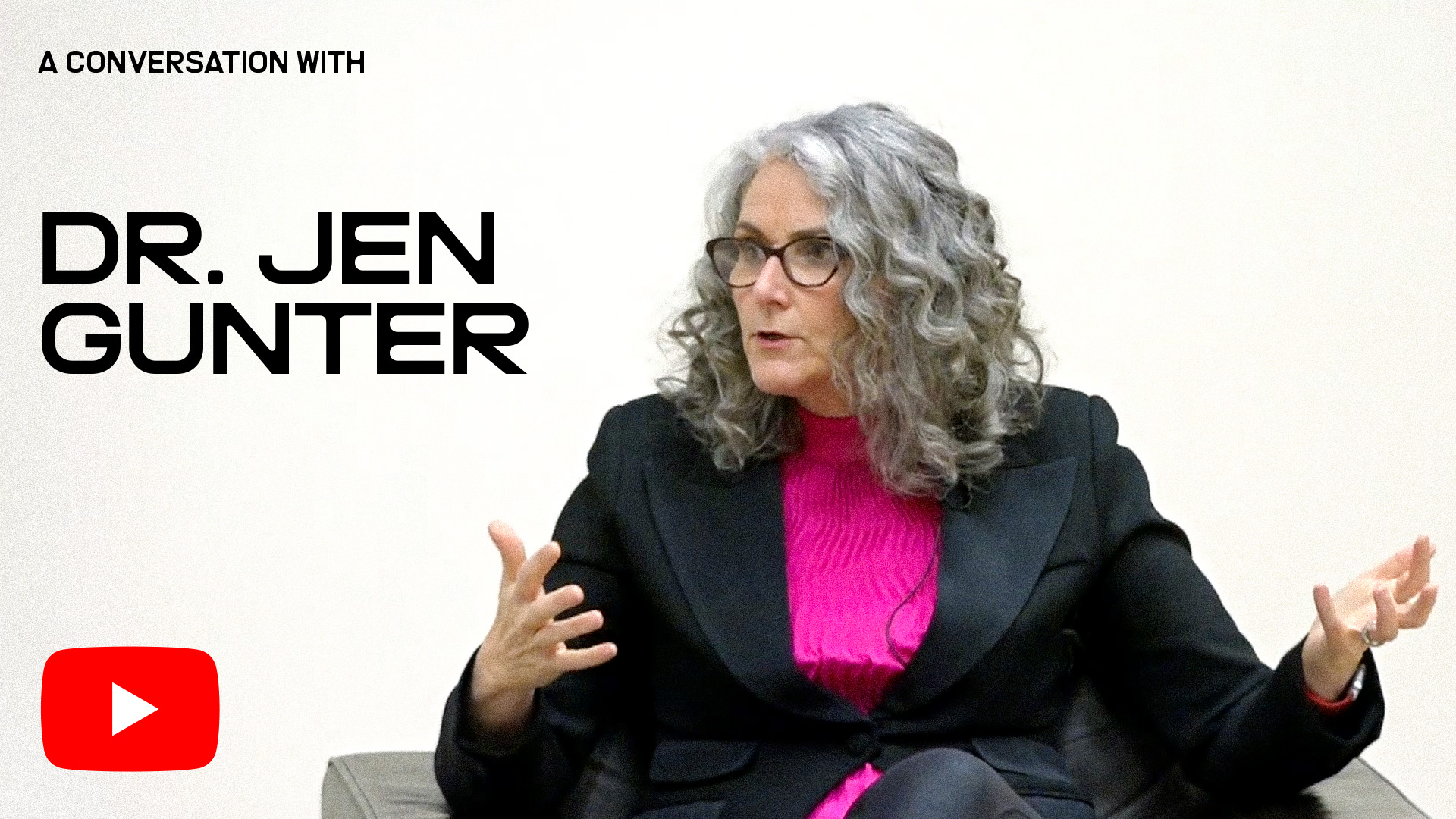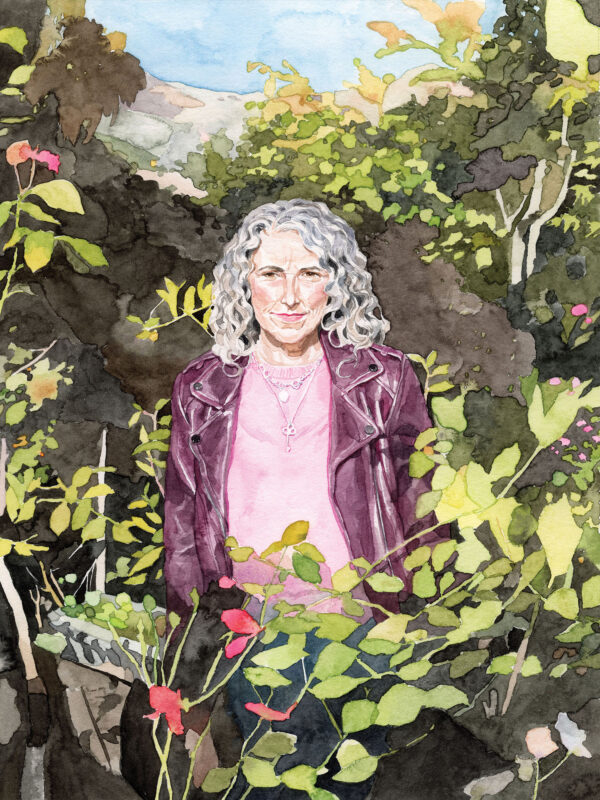A practicing physician, bestselling author, blogger and podcaster, Dr. Jennifer Gunter has built a reputation—and massive following—as the internet’s go-to OB/GYN.
Known for her fact-based, no-nonsense approach, she’s setting the record straight on menstruation, menopause and everything in between. Alice Taylor spoke with Gunter, who completed her residency training at Western’s Schulich School of Medicine & Dentistry (1990 to 1995), about her journey, the urgent need for better women’s health care and why we should pay attention to the growing threats to reproductive freedom.
What inspired you to become a doctor?
My interest in medicine really stemmed from my own experiences with the health-care system as a child. When I was 11, I ruptured my spleen skateboarding. While running tests, doctors discovered I also had a kidney disease. This was before ultrasound and CT scans, so the testing was invasive and meant a lot of hospital visits. Eventually, I had a kidney removed and spent about five months in and out of the hospital. That experience definitely put me on the path to becoming a doctor.
Why did you decide to specialize in women’s health?
When I got into medical school, I had no idea what being an OB/GYN involved—or what surgeons or paediatricians did either, for that matter. It all felt nebulous. But I’d always been interested in women’s health. When I was in high school, abortion was heavily restricted in Canada, requiring a three-member panel to approve it. I was deeply affected when Dr. Henry Morgentaler opened a clinic in Winnipeg. It was all over the news, and I felt strongly that women should have autonomy over their own bodies. My parents—despite being conservative—were pro-choice and encouraged me to get involved. I participated in protests, and those experiences made me realize that taking a stand matters. Seeing like-minded people around me fostered a sense of community, which is so important when fighting for a cause. That passion stayed with me into medical school, so specializing in women’s health felt like the natural path.
What inspired you to become such a vocal advocate for evidence-based health care, particularly for women?
While I was doing my residency at Western, people would come in and ask me questions about things they had read in People magazine or Reader’s Digest—social media didn’t exist back then. One common concern was whether tampons contain asbestos—they don’t, by the way. I was curious and started looking through magazines in the waiting room and encountered this type of misinformation firsthand. It’s fascinating—and troubling—that some of the same myths from back then still circulate today, three decades later.
Much later, I was writing a book inspired by my own experiences with complicated pregnancies that resulted in my children being born prematurely. That made me even more aware of the gap in accessible, easy-to-understand health information. By the time my book, The Preemie Primer, was published in 2010, the internet had become a powerful tool. A friend suggested I join what was then called Twitter, which led me to start a blog, and it snowballed from there.
The best way to push back is to focus on improving health literacy and blocking sources of misinformation.
Has access to accurate health information improved or worsened since that time?
Both—it’s a mixed bag. In the early days of the internet, vaccine misinformation was the main medical online conspiracy. There were other fringe ideas, but nothing widespread until Goop—a wellness and lifestyle brand founded by actress Gwyneth Paltrow—launched in 2008 and took even the most outrageous health claims mainstream. Suddenly, myths like “bras cause breast cancer” were getting media attention, which only served to legitimize them. Social media then amplified the problem, making sensational claims go viral while evidence-based ones were ignored. Today, thanks to influencers and short-form video content, misinformation spreads faster than ever. Consumers often can’t tell the difference between credible experts and influencers pushing questionable products. Without clear disclosures, people absorb misinformation without questioning it.
How can we effectively push back against health misinformation?
It’s tough. The truth isn’t as flashy as misinformation. Saying, “You need 25 grams of fibre a day” isn’t nearly as Instagram-friendly as “Buy my life-changing fibre supplements.” Algorithms favour sensational content, which makes it
harder to get evidence-based information out there. Also, health influencers—whether they’re doctors, dietitians or physical therapists—often mix accurate advice with misinformation. For example, they might recommend eating enough protein, which is true, while in the same breath falsely claim menopause hormone therapy (MHT) solves every problem. The truth gets over-shadowed, making it difficult to separate fact from fiction. The best way to push back is to focus on improving health literacy and blocking sources of misinformation. Continuing to follow them only fuels confusion—misinformation is sticky, and propaganda works.
Menopause really seems to be having a moment thanks in large part to your books and your blog. Why do you think there is so much interest now?
I’ve been writing and speaking about menopause for years, and I think my book The Menopause Manifesto that came out in 2021 has contributed to taking this topic mainstream. But, of course, it’s a combination of factors. The growing media visibility of menopause-related products is sparking more conversations, and Gen X women—who are generally more open about sharing their experiences online—have played a key role in breaking the silence and normalizing these discussions.
At the same time, there’s renewed interest in MHT. The Women’s Health Initiative (WHI)—a series of clinical studies initiated in 1991 by the National Institutes of Health—linked MHT to increased risk of blood clots, stroke and breast cancer. This initially caused a lot of fear around hormone therapy, leading to a sharp decline in its use. Today, people are revisiting MHT with a more balanced perspective. It’s a viable option for those experiencing symptoms, but it’s not for everyone—some sail through menopause without any issues. Like any medication, MHT comes with risks, but given the right information adults can weigh their options and make informed decisions.
What do you think needs to change to better support women experiencing menopause?
Education is key. When people don’t understand their bodies, they suffer—whether it’s as simple as an ingrown toenail or more significant issues like hot flashes and osteoporosis risk. Too many women have no idea what to expect, which leaves them vulnerable to misinformation and fear. Without access to evidence-based care, women may turn to unproven alternatives, which can be harmful. Governments could do a lot by introducing simple, cost-effective solutions—such as online educational resources in multiple languages—to bridge this knowledge gap. We have public campaigns for smoking and drinking and driving—why not menopause?
Are we moving backward in terms of women’s access to health care and support?
In many ways, yes. Progress has often been performative—offering small wins that distract from deeper systemic issues. Women’s health care is frequently deprioritized, with gynaecological surgeries among the first to be postponed during hospital backlogs. Meanwhile, the lack of scientific research into conditions like endometriosis leaves doctors with limited treatment options.
Funding structures further hinder progress. Gynaecology is typically underfunded and undervalued relative to other specialities, making it more difficult to sustain research careers in women’s health, which stalls advancements and delays better treatment options for women. And, of course, reproductive freedom is also increasingly under threat. Many Canadians mistakenly assume their rights are secure, but that’s a dangerous misconception. Abortion care is not guaranteed. It must be actively defended. A single election could change everything. Voter apathy poses a serious threat—staying informed and showing up at the polls is critical to protecting these rights.


